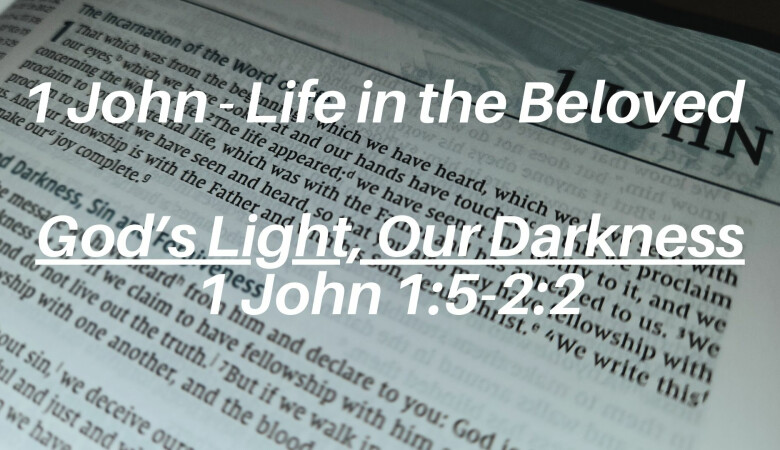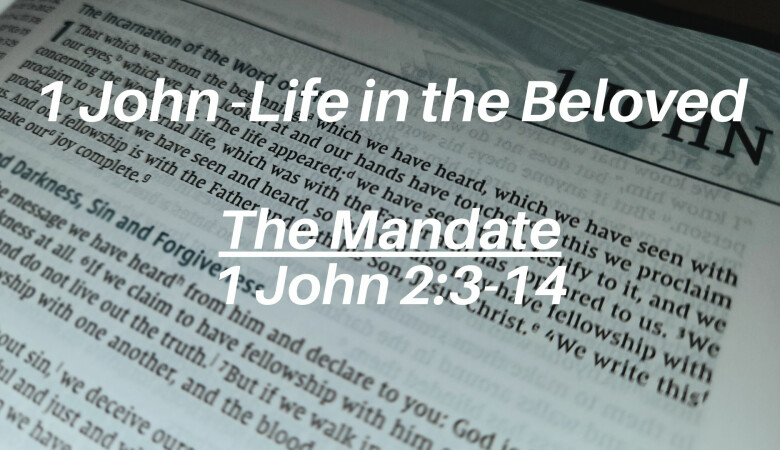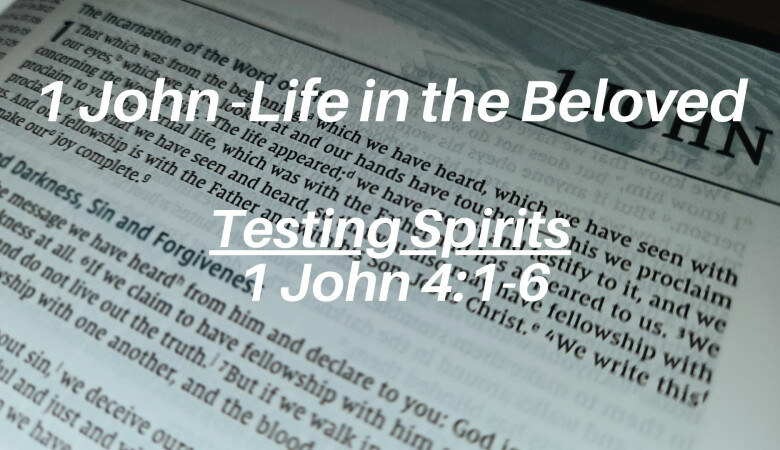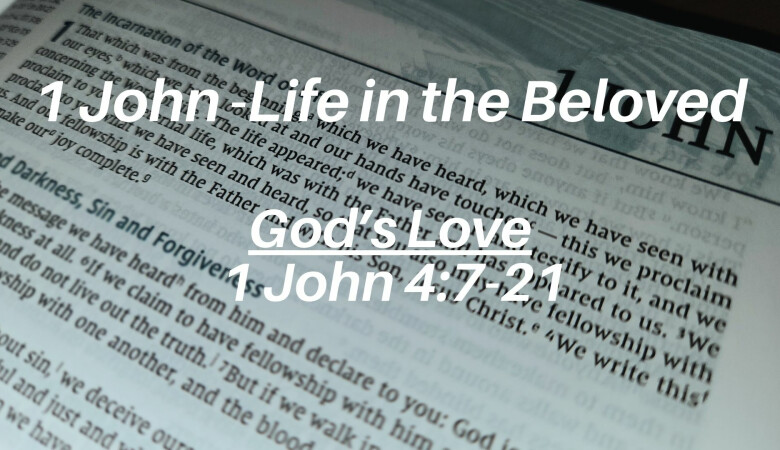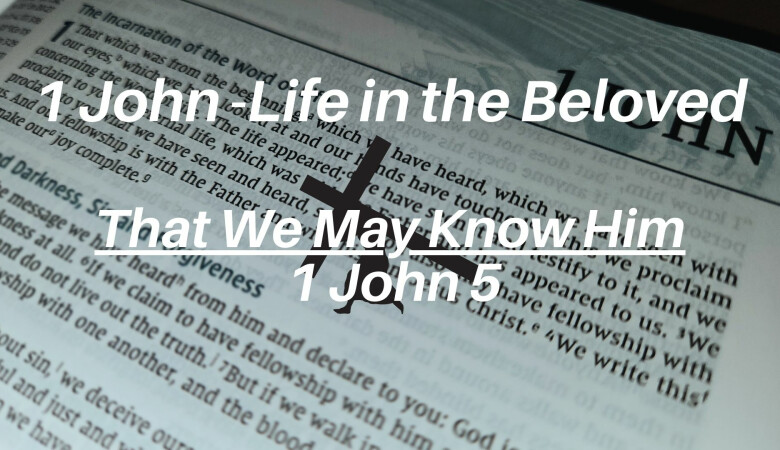Series: Life in the Beloved
Like Father, Like Child
October 15, 2023 | Peter Rowan
Passage: 1 John 2:28-3:10
ALL SERMONS IN SERIES
Summary
A consistent truth of Scripture is that we become like what we worship. In the Old Testament book of Leviticus (and in the NT book of 1 Peter) we hear this taught in this way: "Be holy as I am holy." God actually desires that we imitate him. After all, we are made in his image, to reflect his goodness. 1 John 3 tells us that we are children of God. And if we are children of God, then we will reflect our Father in Heaven.
Transcript
One of the really wonderful things about living in Harrisburg is that you can live in a walkable neighborhood like this one here, but you can rather easily be out in the woods or on a farm. Our church retreat property is only 15 minutes from here, but you really are out in the woods, in the middle of nature. Of course, one of the benefits of this kind of city that has proximity to nature and farms is that in the fall you can go to those farms. You can go and pick pumpkins to your hearts content. And of course, you can go and pick apples. And we all know that pumpkins don’t grow on apple trees, they are connected to a certain kind of vine and only those ground vines will grow certain kinds of pumpkins. If you go to Strites or our to Mt Airy (which in my mind is still Paulus’) you can clearly see that some trees grow cortland apples and some grow honeycrips and some grow winesaps. Certain fruit come from certain trees. Apples don’t fall far from trees.
We moved here when Lillie was just 18 months old. She is now nearly ten and she is one of the apples of my eye and such a delight to me. Some of you will maybe remember how Melise would say when Lillie was really little, “If you want to see what Peter would look like in a dress, just look at Lillie!” I remember when Henry was born and the first thing that Gordon Zubrod told me is that no judge would ever believe me if I said these kids aren’t mine! As we like to say, “The Rowan genes run strong!” And the fact is, those genes will run strong for good and for ill.
People that spend a lot of time looking at one another often come to resemble one another. It’s believed that we instinctively copy, mimic one another’s facial expressions and tone of voice and gestures. It’s why when you are talking to someone from Australia all of the sudden the conversation gets awkward. You start saying things like “Good day, mate. Let’s put another shrimp on the barby.” So, not only do my kids resemble me because of their genes, but they resemble our tone of voice, they mimic how we engage with others, with our neighbors, with you all, with books and music and the Bible and church, and with ourselves.
I imagine many of you are familiar with Brent Brown. Her Ted Talk, “The Power of Vulnerability” is the fifth most-watched Ted Talk ever with well over 60 millions views. She has written a number of books that are well worth your time. Her book on parenting is title, “The Gift of Imperfect Parenting.”
But she wrote this parenting manifesto. I want to read it to you:
Above all else, I want you to know that you are loved and lovable. You will learn this form my words and actions—the lessons on love are in how I treat you and how I treat myself. I want you to engage with the world from a place of worthiness. You will learn that you are worthy of love, belonging, and joy every time you see me practice self-compassion and embrace my own imperfections. We will practice courage in our family by showing up, letting ourselves be seen, and honoring vulnerability. We will share our stories of struggle and strength. There will always be room in our home for both. We will teach you compassion by practicing compassion with ourselves first; then with each other. We will set and respect boundaries; we will honor hard work, hope, and perseverance. Rest and play will be family values, as well as family practices.
You will learn accountability and respect by watching me make mistakes and make amends, and by watching how I ask for what I need and talk about how I feel. I want you to know joy, so together we will practice gratitude.
I want you to feel joy, so together we will learn how to be vulnerable. When uncertainty and scarcity visit, you will be able to draw from the spirit that is a part of our everyday life. Together we will cry and face fear and grief. I will want to take away your pain, but instead I will sit with you and teach you how to feel it. We will laugh and sing and dance and create. We will always have permission to be ourselves with each other. No matter what, you will always belong here. As you begin your Wholehearted journey, the greatest gift that I can give to you is to live and love with my whole heart and to dare greatly. I will not teach or love or show you anything perfectly, but I will let you see me, and I will always hold sacred the gift of seeing you. Truly deeply seeing you.
That’s really beautiful. In lots of ways that’s really beautiful. The thing that she keeps coming back to in that and what she gets at all the time with her thoughts on parenting is the apple never falls far from the tree. Children become like their parents. I know, I know, I have 6 siblings and we are all different, but the fact is that we all learned most of how we are to be in the world from our parents.
This begs you to ask yourself, if you are a parent, questions like “Do you practice gratitude?” “What tones of voice to a use to speak of others and of myself?” “Have I learned to sit in pain and face fear and grief?” “Do I practice confession - against God, against others?”
But it also begs all of to ask the question of this passage: who’s child are you? What family are we living in? What father do we resemble? What habits, what practices have we learned and who have we learned them from? Who are we living life with? Who are we abiding in?
It is the very fact of family resemblance that John is speaking about in this beautiful passage that we have heard. It’s undeniably true in physical appearance and Brene Brown says over and over again that it is undeniably true in your emotional experience, but it is absolutely true also in the spiritual.
Who’s child are you?
And this little passage here gives us two options: are you the children of God or the children of the devil.
Now, I know that making it that simple is off-putting to some. But I think also it presents us with a truth that is worth admitting and that is that for many many of us as soon as we talk about God as Father it is not someone that is appealing, or inviting, or attractive. It’s not one of the thoughts of the Christian message that we are drawn to, even though it is right at the heart of the Christian message. And it isn’t attractive because we have had fatherly experiences that are devil-like.
Devil as Father
Let’s consider the two verses here that really speak of the Devil as father.
(8) Whoever makes a practice of sinning is of the devil, for the devil has been sinning from the beginning.
(10) By this it is evident who are the children of God, and who are the children of the devil: whoever does not practice righteousness is not of God, nor is the one who does not love his brother.
We learn here in verse 8 that the Devil has been sinning from the beginning. And if we just think back on that story all the way back in Genesis 3 - like we did last week - for a moment, we can think of how the devil practiced deceit, how he promoted a lie, how he sought out death, how his words produced hiding. What came of that? If we only consider the first few chapters of Genesis, we find greed and death and self-promotion and a rejection of God.
That’s all the same stuff that so many have experienced from horrible parents. Parents that kept lies or that told lies (“you’ll never amount to anything!” “you are a drain on my energy and my resources!” “My life would be better without you!”). Parent that promoted hiding and taking and stealing that which wasn’t theirs. Parents that hid their hearts from you, but also their resources. Parents that promoted death. Parents that were abusive with their bodies and with their words. Parents that didn’t keep promises, to one another or to you. Parents that didn’t practice righteousness.
And what that did was create in you the deepest longing for peace in the midst of chaos, honor in the midst of shame, safety in the midst of fear, life in the midst of death, love in the midst of hate. And you believed that those longings cannot be met in a fatherly or motherly relationship.
But God says that you were made for his family.
God as Father
See what kind of love the Father has given to us, that we should be called children of God; and so we are.
John here wants the churches he is writing to to continue in the faith. We’ve seen how he has told them of the beauty of a God who takes on flesh and dwells among us, or a God who deals honestly with sin and invites us to do the same, of a God who is the true light in the darkness and draws us out from the darkness into his marvelous light, of a truth-telling God who calls us out from being people of the lie to people of the truth. And now he longs for these people to abide in him as father.
You see, everyone has to have a father. You don’t get the option of not having one. He might have never been around, but you always have a father. And here John is inviting us into the life of the perfect Father and into an imitation of that perfect father.
If you have read Brene Brown, you know that her big fight is against the evil of shame and that the answer to shame is love.
Listen how God as father is spoken of:
28 And now, little children, abide in him, so that when he appears we may have confidence and not shrink from him in shame at his coming.
If you abide in the Fatherly love of God, you will see that the kind of love that father has given us is a love that brings us into his family. He doesn’t lie to us, or abandon us, or cut us off, but he brings us in and cares for us. He loves us and he instructs us.
And the effect of this is that we start to imitate him. We start to look like him. We start to love the things he loves and hate the things he hates. We start to practice righteousness, we start to promote peace, we start being people in the light, we start being honest with sin.
Who’s child are you? What life are you living into?
There is a great invitation in the Christian Faith to find your life in abiding with the Father through the work of the son and the Spirit. And that invitation is an invitation to a new family and a new life. You are not bound by the practices and habits of your family or your neighbors or of your childhood friends. You are not bound to live out of the worst things that have happened to you. God really does offer you a new life though the work of Jesus and the invitation of the heavenly Father.
Neuroplasticity may be a relatively new field of study, the truth that our brains can really change and adapt and grow. But moving from being children of the darkness to children of the light is as old as the gospel. God invites you into a new family, with new practices, new traditions, new words.
Let me end by reading you a profoundly sad and profoundly beautiful story. This was written in Christianity Today by Russell Moore.
The creepiest sound I have ever heard was nothing at all. My wife, Maria, and I stood in the hallway of an orphanage somewhere in the former Soviet Union, on the first of two trips required for our petition to adopt. Orphanage staff led us down a hallway to greet the two 1-year-olds we hoped would become our sons. The horror wasn't the squalor and the stench, although we at times stifled the urge to vomit and weep. The horror was the quiet of it all. The place was more silent than a funeral home by night.
I stopped and pulled on Maria's elbow. "Why is it so quiet? The place is filled with babies." Both of us compared the stillness with the buzz and punctuated squeals that came from our church nursery back home. Here, if we listened carefully enough, we could hear babies rocking themselves back and forth, the crib slats gently bumping against the walls. These children did not cry, because infants eventually learn to stop crying if no one ever responds to their calls for food, for comfort, for love. No one ever responded to these children. So they stopped.
The silence continued as we entered the boys' room. Little Sergei (now Timothy) smiled at us, dancing up and down while holding the side of his crib. Little Maxim (now Benjamin) stood straight at attention, regal and czar-like. But neither boy made a sound. We read them books filled with words they couldn't understand, about saying goodnight to the moon and cows jumping over the same. But there were no cries, no squeals, no groans. Every day we left at the appointed time in the same way we had entered: in silence.
On the last day of the trip, Maria and I arrived at the moment we had dreaded since the minute we received our adoption referral. We had to tell the boys goodbye, as by law we had to return to the United States and wait for the legal paperwork to be completed before returning to pick them up for good. After hugging and kissing them, we walked out into the quiet hallway as Maria shook with tears.
And that's when we heard the scream.
Little Maxim fell back in his crib and let out a guttural yell. It seemed he knew, maybe for the first time, that he would be heard. On some primal level, he knew he had a father and mother now. I will never forget how the hairs on my arms stood up as I heard the yell. I was struck, maybe for the first time, by the force of the Abba cry passages in the New Testament, ones I had memorized in Vacation Bible School. And I was surprised by how little I had gotten it until now
Series Information

The book of 1 John is a letter from the last remaining apostle to group of house churches he oversees near Ephesus. It is a message of encouragement to saints who have grown weary with the unbelief of those around them. John writes to them and us as one who has known and been known by Jesus - and has found Jesus to be full of light, kindness and love.


